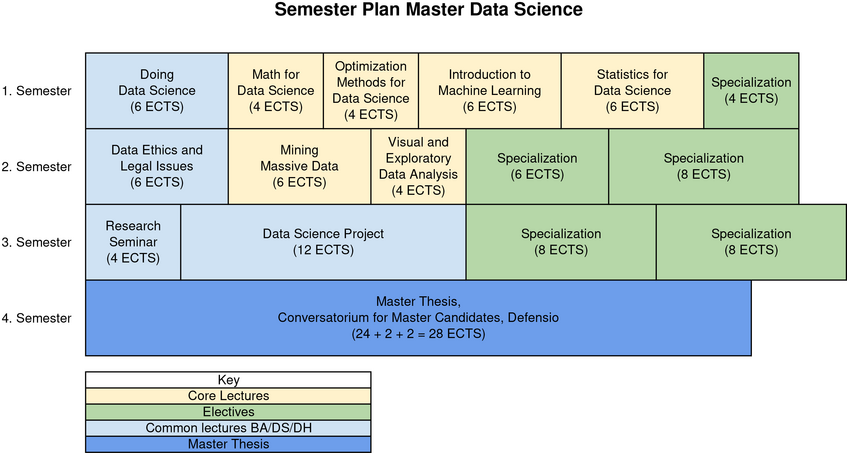Master - Data Science
The goal of the Master's programme in Data Science at the University of Vienna is to provide a practically oriented and scientifically sound education in the field of modern data science. Data Science is an essential driving force in today's digital world. Nowadays, large amounts of data are collected and generated in almost all areas of the economy. Recently, data-driven methods have also found their way into various parts of the natural and human sciences. The task of data science is to gain knowledge from ever larger amounts of data, which represents added value for the respective area. This requires not only the development of efficient algorithms, but also a basic understanding of the interpretability and reliability of the results. This requires diverse and interdisciplinary skills, which includes the practical handling of large amounts of data, a solid mathematical and statistical foundation, as well as knowledge in the respective area of application. In addition, the rapid developments in data science raise ethical and legal questions. The Data Science Master's programme at the University of Vienna comprehensively reflects all these core skills, emphasizes the interdisciplinary and heterogeneous character of Data Science and places it above a specialisation in individual areas.
While the masters degree in data science prepares for a doctoral degree in mathematics, computer science, or statistics, it also teaches practical skills, such as the handling of huge amounts of data, the statistical analysis of complex data and the development, implementation and analysis of efficient algorithms for data analysis, which are in great demand in industry.
Facts
Duration: 4 semesters
Credits: 120 ECTS points
Degree: Master of Science (MSc)
- Availability: 40 university places per academic year
Language of Instruction: English
Degree Programme:
645Administered by:
SPL 5 (Informatik und Wirtschaftsinformatik)
These topics can be expected during your studies including possible focus areas:
- Machine Learning
- Mathematical & Statistical Foundations
- Optimization Methods
- Mining Massive Data
- Visual and Exploratory Data Science
Data Science – a short introduction
Details to the curriculum
Graduates of the Master's programme in Data Science receive a sound and broad education in core modules, including algorithmic, mathematical, and statistical foundations, the handling of large amounts of data, and explorative data analysis. In addition, graduates are familiarized with ethical and legal aspects and gain practical experience in concrete application problems. In the elective modules, graduates are introduced to the state of the art of data science in aspects of computer science, mathematics, and statistics. Further, students acquire in-depth knowledge in concrete fields of application, e.g. from humanities, language processing, finance, medicine, physics, or computational science.

Curriculum
You can download the full text of the currently valid version of the Master Data Science curriculum here: https://informatik.univie.ac.at/studium/studienangebot/master/master-data-science/curriculum-master-data-science/
